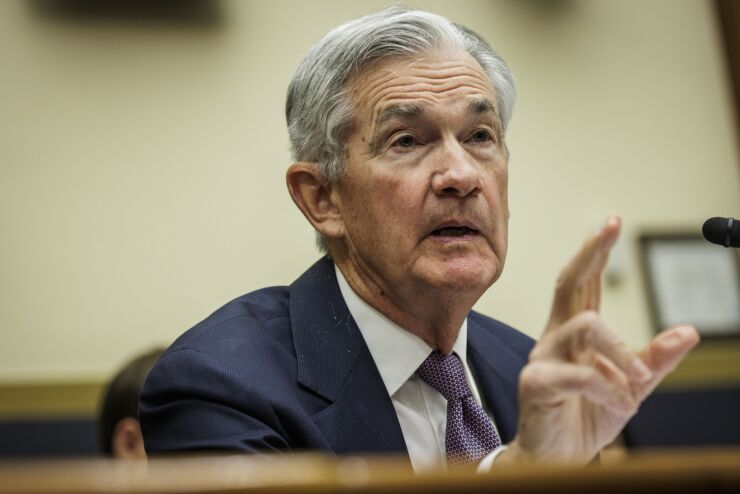
The Federal Reserve does not give the Consumer Financial Protection Bureau a "blank check" to fund its budgets, Fed Chair Jerome Powell told lawmakers on Wednesday.
During a three-hour-long House Financial Services Committee Hearing, Rep. Blaine Luetkemeyer, R-Mo., asked Powell whether the Fed had any oversight authority for the CFPB's spending plans. Powell said the Fed does not.
"So, they just get a blank check," Luetkemeyer said. "You just told me they just get a blank check. They send you a bill. You send them a check. There's no accountability there."
Powell disputed that characterization, saying the CFPB's budget is capped by the Dodd-Frank Act of 2010, the legislation that authorized the creation of the agency.
"No, I think there are limits built into the law," Powell said, "which I don't have in the front of my head."
Luetkemeyer questioned whether that statutory limit was actually adhered to.
"I have yet to see a limit, Mr. Chairman," he said. "I'd love to see what the limits are because I don't think that they've ever agreed to have that."
The exchange was one of several during the hearing that touched on the Fed's relationship with the CFPB. The conversations come at a time when the bureau's funding mechanism is having its constitutionality
According to the text of Dodd-Frank, the Fed is supposed to transfer an amount deemed "reasonably necessary" for the CFPB to carry out its duties. The law states that this amount shall not exceed 12% of the Fed's annual operating expenses, with an allowance for adjustments in line with the federal government's employee cost index.
Last fall, the U.S. Court of Appeals for the Fifth Circuit deemed this
Powell, who appeared in front of the Financial Services Committee to
"We have no role in engaging with that," Powell said. "We share a common inspector general who does work on those issues, but we … don't have any governance of any kind over the CFPB. We're just a source to them."

Another issue raised is how the CFPB's budget would be impacted by the fact that the Fed is losing money. After rapidly raising interest rates last year, the Fed is now paying banks and money market mutual funds higher rates on their deposits — known as reserves — than it is able to generate from its Treasury securities portfolio.
Powell said this net operating loss would not prevent the Fed from providing funding to the CFPB or covering any of its other expenses.
"We don't shut down the Fed when we have negative income," Powell said. "We can pay our bills."
He added that during the past decade, when interest rates were at historic lows, the Fed turned over roughly $1.2 trillion of excess earnings to the Treasury Department.
Powell was also peppered with questions about the Fed's ongoing "holistic" capital review, which was a
Powell reiterated that the review, which is being spearheaded by Vice Chair for Supervision Michael Barr, is effectively a routine exercise for whoever takes on the Fed's chief regulatory role. He also noted that any changes would be opened up to public comment and review by the Federal Deposit Insurance Corp. and the Office of the Comptroller of the Currency before being put in front of the full Fed Board of Governors for a vote.
"There isn't a proposal to evaluate or talk about yet. Vice Chair Barr has indicated he was going to take a look, he said he thinks capital is strong and the question really is, is it strong enough?" Powell said. "I know he's been working and there'll be a process when he does arrive at conclusions. He has no authority to enact something himself, he has to go through the Board of Governors, also through the FDIC and the OCC."
During the hearing, Powell also faced questions about the potential issuance of a central bank digital currency. As he has said in previous testimonies and public remarks, Powell said the Fed would rather not move forward with a consumer-facing, or retail, CBDC without being directed to by Congress.
Yet, Powell said it is "less clear" if such authorization is necessary for it to create a wholesale digital dollar, one that could be used for settlements between banks, independently.
"It would look an awful lot like a bank reserve," Powell said. "And you might ask, well, why do we need it? And that's a really good question, too."





